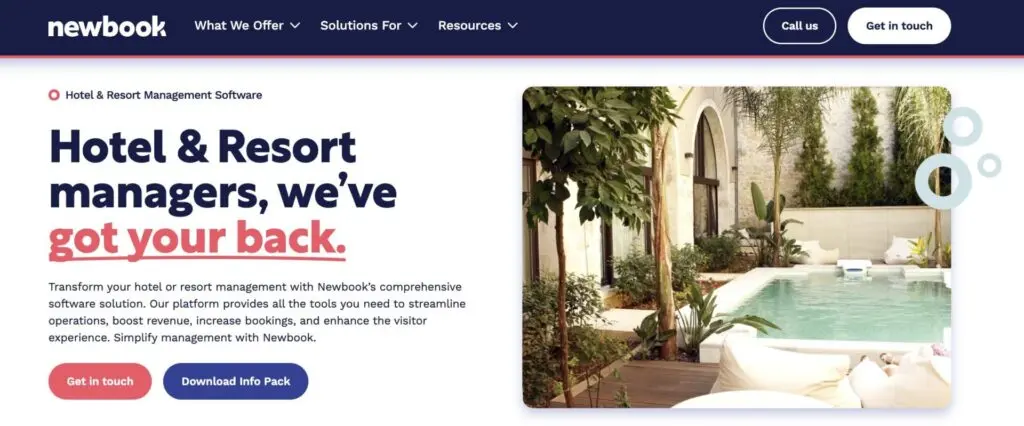Whether you own a small boutique hotel or a large chain of properties, when it comes to the basics, hotels all want the same thing: to boost guest satisfaction, sell more amenities and rooms, and ultimately increase revenue.
The thing is, there are a lot of moving parts when it comes to hotel management. Keeping tabs on staff and scheduling in multiple areas like cleaning and maintenance, financials, marketing efforts, bookings, and guest information demands a centralized technology solution, especially in today’s online world.
For example, almost every hotel or other accommodation business utilizes OTAs, or online travel agencies like Expedia, Booking.com, Airbnb, or VRBO. Even though these organizations take a commission for each successful booking, the traffic they bring to different accommodation businesses more than makes up for the percentage taken from each booking. Most accommodation providers list multiple OTAs to extend their reach as far as possible. But when you have bookings coming in from multiple sources, it quickly becomes impossible to manage them manually.
Without some sort of digital solution to keep everything in check, you risk disasters like double bookings. Newbook’s hotel management software includes a built-in channel management system that filters OTA and direct bookings into the same place, keeps them organized, and ensures that every platform is updated in real-time for each successful booking.
That’s just one example of what hotel management software can do to boost efficiency and productivity in your business.
In this article, we explore more about this essential piece of software, including giving more insight into why it’s so important to invest in and how you can implement it into your accommodation business.
So you manage a hotel? We make it easy
Newbook is your all in one hotel management software. Talk to us today to learn how you can improve operations and increase bookings for your hotel.


What Is Hospitality Management Software?

Hotel management software is a specialized system designed to assist in managing hotel operations. It integrates various functions to streamline and automate hotel management tasks, making the process more efficient and effective.
Key Features of Hotel Management Systems
The table below provides an overview of the key features and functionalities of a typical hotel management system:
| Essential Feature of a Hotel Management System | Insight |
|---|---|
| Reservation Management | –Booking Engine: Allows guests to book rooms online through the hotel’s website.Channel Management: Syncs room availability and rates across multiple booking platforms.Front Desk Operations: Manages check-ins, check-outs, and room assignments. |
| Guest Management | –Customer Relationship Management (CRM): Stores guest profiles, preferences, and history to enhance personalized service.Communication Tools: Enables direct communication with guests via email or SMS. |
| Housekeeping Management | –Task Scheduling: Assigns and tracks housekeeping tasks.Room Status Updates: Provides real-time updates on room cleanliness and maintenance status. |
| Billing and Invoicing | –Integrated Payment Processing: Handles various payment methods, including credit cards and digital wallets.Automated Invoicing: Generates and sends invoices to guests. |
| Reporting and Analytics | –Performance Reports: Generates reports on occupancy rates, revenue, and other key metrics.Forecasting: Helps predict future demand and optimize pricing strategies. |
| Inventory Management | –Stock Control: Manages inventory for housekeeping supplies, food and beverage, and other hotel amenities.Purchase Orders: Automates the procurement process for replenishing stock. |
| Point of Sale (POS) Integration | –Restaurant and Bar Management: Integrates with POS systems for seamless billing and inventory tracking.Check in and Check out: Allows guests to digitally check in and check out, as well as pay any outstanding bills. |
| Mobile Access | –Mobile Apps: Provides mobile access for staff to manage operations on-the-go.Guest Apps: Offers mobile apps for guests to make reservations, check-in, and request services. |
Benefits of Using Hotel Management Software
There are a myriad of benefits that you gain for your accommodation business when you invest in a hotel management system. These benefits include:
1. Improved Efficiency
- Automation of routine tasks: By automating hotel processes such as reservations, check-ins, and check-outs, hotel staff can focus on more value-added activities, reducing the likelihood of human error and saving time.
- Real-time updates: Provides up-to-the-minute information on room availability, housekeeping status, and guest requests, allowing staff to respond quickly and efficiently.
- Seamless integration: Integrates various hotel operations into a single platform, reducing the need for multiple systems and minimizing data discrepancies.
2. Enhanced Guest Experience
- Personalized service: Stores guest preferences and history, enabling staff to offer personalized services such as preferred room settings, special dietary requirements, or tailored activity recommendations.
- Efficient communication: Facilitates direct and timely communication with guests through automated emails and SMS, enhancing guest satisfaction by keeping them informed about their reservations, special offers, or any updates.
- Self-service options: Offers guests self-service capabilities through mobile apps or online portals for booking, check-in, room service requests, and more, providing a more convenient and engaging experience.
3. Data-Driven Decision Making
- Comprehensive reporting: Generates detailed reports on key performance indicators such as occupancy rates, average daily rates (ADR), revenue per available room (RevPAR), and guest feedback, helping managers make informed decisions on hotel revenue and operations.
- Forecasting and analysis: Utilizes historical data and trends to forecast future demand, enabling hotels to plan and allocate resources effectively and implement dynamic pricing strategies.
- Revenue management: Helps optimize room rates based on demand patterns, competitive pricing, and market conditions, maximizing revenue.
4. Increased Revenue
- Optimized pricing: Implements revenue management techniques to adjust room rates dynamically based on real-time demand, market trends, and competitor rates, ensuring optimal pricing and maximizing revenue.
- Upselling and cross-selling: Identifies opportunities to upsell premium rooms or additional services (e.g., spa treatments, dining experiences) during the booking process or throughout the guest’s stay, increasing overall spend per guest.
- Channel management: Ensures optimal distribution of room inventory across multiple online travel agencies, increasing visibility and bookings while reducing the risk of overbooking or underbooking.
5. Streamlined Operations
- Centralized management: Provides a unified platform to manage all aspects of hotel operations, from front desk and housekeeping to inventory and maintenance, simplifying workflows and improving coordination.
- Task automation: Automates routine tasks such as generating invoices, managing inventory, and scheduling housekeeping, freeing up staff to focus on more strategic and guest-centric activities.
- Inventory control: Tracks inventory levels in real-time, automates reordering processes, and reduces wastage by ensuring optimal stock levels, particularly for housekeeping supplies and food and beverage items.
6. Enhanced Security
- Data protection: Ensures the security of guest data and payment information through advanced encryption and compliance with data protection regulations, reducing the risk of data breaches and enhancing guest trust.
- Access control: Provides role-based access controls, ensuring that sensitive information is accessible only to authorized personnel, enhancing operational security.
7. Scalability and Flexibility
- Scalable solutions: Adapts to the needs of hotels of all sizes, from small boutique hotels to large hotel franchises, allowing for easy expansion and integration of additional functionalities as the business grows.
- Customization: Offers customizable modules and features that can be tailored to the specific needs and preferences of the hotel, providing flexibility and ensuring that the software meets unique operational requirements.
8. Environmental Sustainability
- Resource management: Helps hotels manage resources more efficiently, such as optimizing energy usage and reducing waste through better inventory management and housekeeping schedules.
- Paperless operations: Reduces the need for paper-based processes by digitizing reservations, invoicing, and guest communications, contributing to the hotel’s sustainability efforts.
Importance of Hotel Management System for Hotel Managers

Hotel management systems play a critical role for hotel managers by streamlining operations, enhancing guest experiences, and improving overall efficiency. These systems integrate various departments and functions into a single platform, making it easier for managers to oversee and coordinate activities. Automation of routine tasks such as booking management, billing, and housekeeping schedules reduces manual effort and minimizes errors, allowing staff to focus on more strategic activities.
The enhancement of the guest experience is another significant benefit. HMS stores guest preferences and history, enabling managers to provide personalized services, which significantly increases guest satisfaction and loyalty. Efficient communication is facilitated through timely and direct interactions with guests, ensuring they are well-informed and engaged throughout their stay.
Data-driven decision-making is greatly supported by HMS, which provides detailed reports and analytics on occupancy rates, revenue, guest feedback, and more. This wealth of information allows managers to make informed decisions and track key performance indicators (KPIs) in real time, identifying areas for improvement. The system’s ability to help implement revenue management strategies, such as dynamic pricing based on demand, competitor pricing, and market trends, is crucial for maximizing revenue. Additionally, HMS identifies opportunities to upsell additional services or premium rooms, further increasing overall revenue.
Operational efficiency is also enhanced through task management features that streamline assignments and monitoring, ensuring efficient use of staff resources. Real-time inventory tracking prevents stockouts and reduces waste, contributing to more effective resource management. In summary, the comprehensive capabilities of hotel management systems make them indispensable tools for hotel managers, facilitating better operational oversight, improved guest satisfaction, and enhanced revenue generation.
How Can a Hospitality Management System Improve Hotel Revenue?
Hospitality management systems are instrumental in improving hotel revenue through several mechanisms. One of the primary ways is through optimized pricing strategies. The system’s ability to implement dynamic pricing allows room rates to be adjusted automatically based on demand, market conditions, and competitor pricing, ensuring that rooms are always priced optimally. Revenue management tools analyze historical data and booking patterns to forecast demand, enabling hotels to plan and adjust pricing strategies effectively.
Another significant benefit of HMS is increased bookings. The system maximizes exposure and bookings by consistently updating room availability across multiple OTAs and booking platforms. Additionally, a user-friendly booking engine on the hotel’s website encourages direct bookings, which typically have lower commission costs compared to those made through OTAs.
Upselling and cross-selling opportunities are maximized through personalized offers based on guest data. This data allows the system to offer room upgrades, late check-outs, or additional services such as spa treatments or dining experiences, increasing the overall spend per guest. Targeted promotions and packages can also be created to appeal to specific guest segments, driving higher average spend.
Enhanced guest loyalty is facilitated by effectively managed loyalty programs that encourage repeat bookings and long-term customer relationships. Exceptional service, driven by improved operational efficiency and guest experience, leads to higher guest satisfaction and loyalty, resulting in more repeat business.
Efficient resource management is another area where HMS contributes to revenue improvement. Automating staff scheduling and task management ensures optimal staff levels and reduces labor costs. Real-time inventory tracking prevents overstocking or stockouts, reducing operational costs and ensuring resources are used efficiently. By streamlining these various aspects of hotel operations, Hospitality Management Systems play a crucial role in boosting hotel revenue.
Your all-in-one, online booking system
Newbook is your all in one online booking system. Talk to us today to learn how you can improve operations and increase booking for your business.


How Hospitality Management Software Systems Can Help Hotel Managers
Hospitality management software systems provide several tools and features that assist hotel managers in their day-to-day operations:
1. Centralized Management
- Unified dashboard: Offers a comprehensive dashboard that provides an overview of all hotel operations, from reservations and housekeeping to maintenance and billing.
- Integration: Seamlessly integrates with other systems such as POS, CRM, and accounting software, creating a cohesive and efficient management environment.
2. Improved Communication
- Internal communication: Facilitates communication between different departments, ensuring that everyone is aligned and informed about daily operations and special requests.
- Guest communication: Enables direct communication with guests for confirmations, special offers, and service requests, enhancing the guest experience.
3. Resource Allocation
- Staff management: Automates staff scheduling based on occupancy levels and anticipated demand, ensuring efficient use of human resources.
- Task automation: Automatically assigns and tracks tasks for housekeeping, maintenance, and other departments, improving productivity and accountability.
4. Data Management and Security
- Data storage: Securely stores guest information, booking history, and financial data, ensuring compliance with data protection regulations.
- Access control: Provides role-based access to sensitive information, ensuring that only authorized personnel can access specific data.
5. Performance Monitoring
- Real-time analytics: Offers real-time analytics and reporting on key metrics, helping managers monitor performance and identify trends.
- Guest feedback: Collects and analyzes guest feedback to understand areas of improvement and implement necessary changes.
6. Revenue Enhancement
- Dynamic pricing tools: Helps implement effective pricing strategies to maximize revenue.
- Marketing integration: Integrates with marketing tools to create targeted campaigns and promotions, driving more bookings and revenue.

Implementing Hospitality Management Systems (HMS) requires careful planning and execution to ensure a smooth transition and maximize the benefits of the system. Here is a detailed guide to help you through the implementation process:
1. Assess Needs and Define Objectives
Begin by assessing the specific needs of your hotel. Identify the pain points in your current operations and define clear objectives for the HMS implementation. Consider factors such as the size of your hotel, the number of departments, and the specific features you need, such as reservation management, guest communication, billing, and reporting.
2. Choose the Right HMS Vendor
Research and select a vendor that offers a Hospitality Management System that aligns with your needs and objectives. Look for vendors with a good reputation, positive reviews, and a proven track record in the industry. Ensure that the system is scalable, customizable, and provides excellent customer support. Request demonstrations and trials to evaluate the system’s functionality and ease of use.
3. Plan the Implementation Process
Develop a detailed implementation plan that outlines the steps, timeline, and resources required. This plan should include:
- Project scope: Define the specific features and modules to be implemented.
- Timeline: Establish a realistic timeline for each phase of the implementation.
- Resources: Identify the team members responsible for the implementation, including an implementation manager, IT staff, and representatives from key departments.
- Budget: Allocate a budget for the implementation, including costs for software, hardware, training, and any additional services.
4. Prepare Your Infrastructure
Ensure that your hotel’s IT infrastructure is ready for the new system. This may involve upgrading hardware, improving network capabilities, and ensuring adequate data storage. Work with your IT team or vendor to address any technical requirements and ensure compatibility with existing systems.
5. Data Migration
Plan and execute the migration of existing data to the new HMS. This includes guest records, reservations, billing information, and inventory data. Ensure data accuracy and integrity during the migration process. It’s advisable to back up all data before starting the migration to prevent data loss.
6. System Configuration and Customization
Work with your vendor to configure and customize the HMS to meet your specific needs. This includes setting up user roles and permissions, customizing templates for invoices and communications, and configuring system settings. Ensure that the system aligns with your operational processes and preferences.
7. Staff Training
Conduct comprehensive training sessions for all staff members who will be using the HMS. This includes front desk personnel, housekeeping staff, managers, and any other relevant employees. Training should cover system navigation, feature usage, and troubleshooting. Provide training materials and resources for future reference.
8. Pilot Testing
Before a full rollout, conduct a pilot test of the system in a controlled environment. Select a small group of users and test the system’s functionality in real-world scenarios. This allows you to identify and resolve any issues or bugs before the full implementation.
9. Full Rollout
Once the pilot testing is successful, proceed with the full rollout of the HMS. Ensure that all staff members are informed and ready for the transition. Monitor the system closely during the initial days of full operation to address any issues promptly.
10. Post-Implementation Support and Evaluation
Provide ongoing support to staff as they adapt to the new system. Maintain open communication channels with the vendor for technical support and updates. Regularly evaluate the system’s performance and gather feedback from staff to identify areas for improvement. Conduct periodic reviews to ensure that the HMS continues to meet your hotel’s needs and objectives.
11. Continuous Improvement
As your hotel grows and evolves, your HMS should adapt to changing needs. Stay informed about new features and updates offered by your vendor. Continuously seek feedback from staff and guests to identify opportunities for further enhancing the system’s functionality and improving operational efficiency.
By following these steps, you can ensure a successful implementation of a Hospitality Management System that enhances operational efficiency, improves guest experiences, and drives revenue growth.
Why Newbook Offers the Best Hotel Management Software

There is a wide range of hospitality management systems available on the market today. A quick Google search will turn up hundreds of different options. With so much choice, it can be difficult to choose a solution you can trust to positively impact your business.
Newbook is an outstanding choice for a comprehensive hotel management software solution that caters to all types of accommodations. It provides a centralized system that ensures information accuracy and reliability for single and multiple properties, streamlining the management of channels, properties, and revenue.
Our integrated solution simplifies the management of accommodations by offering a wide range of essential services within one user-friendly platform. Newbook includes a powerful booking engine, self-service options for guests, and built-in channel management for OTAs, providing everything you need in a single package.
Recognizing the importance of seamless integration, Newbook supports hundreds of integrations with popular tools through our integrations store, ensuring smooth operation across various platforms.
Security and continuity are paramount. With a robust 99.99% uptime guarantee and advanced cybersecurity and data protection protocols, Newbook ensures uninterrupted revenue generation without the worry of downtime.
While many hospitality management system software solutions offer a 99% uptime guarantee, the extra .99% translates into more reliability:
| Uptime Guarantee | Meaning |
|---|---|
| 99% | -Over three days of potential downtime annually |
| 99.99% | -52 minutes of potential downtime annually |
Beyond technology, Newbook is dedicated to delivering personalized customer service. From the initial onboarding process to continuous support, we provide a white-glove service experience. At Newbook, we aim to build genuine partnerships with our customers, acting not only as a technology provider but also as a trusted ally in their daily operations. Choose Newbook as your property management solution for unmatched efficiency, security, and support in your accommodation business.
So you manage a hotel? We make it easy
Newbook is your all in one hotel management software. Talk to us today to learn how you can improve operations and increase bookings for your hotel.


Conclusion
In today’s competitive hospitality industry, whether managing a small boutique hotel or a large chain of properties, the fundamental goals remain the same: enhancing guest satisfaction, maximizing the sale of amenities and rooms, and ultimately driving revenue growth. Effective hotel management involves coordinating various dynamic components, including staff scheduling, maintenance, financial tracking, marketing, bookings, and guest relations. This complexity necessitates a centralized technological solution, especially in the digital era where online travel agencies (OTAs) play a crucial role.
Managing bookings manually from multiple sources is impractical and prone to errors like double bookings. Newbook’s hotel management software addresses this challenge by consolidating bookings from OTAs and direct channels into one system, ensuring real-time updates and seamless organization. This is just one example of how hotel management software can significantly boost operational efficiency and productivity.
Hotel management software, such as Newbook, integrates critical functions to streamline operations, enhance guest experiences, and provide comprehensive reporting and analytics. This leads to data-driven decision-making, optimized pricing strategies, increased bookings, and improved resource management. Additionally, these systems offer features like customer relationship management, housekeeping management, billing and invoicing, inventory management, and mobile access, all of which contribute to a more efficient and effective hotel management process.
Discover how Newbook can streamline your business operations and boost your revenue at the same time. Reach out to us today for a demo!

